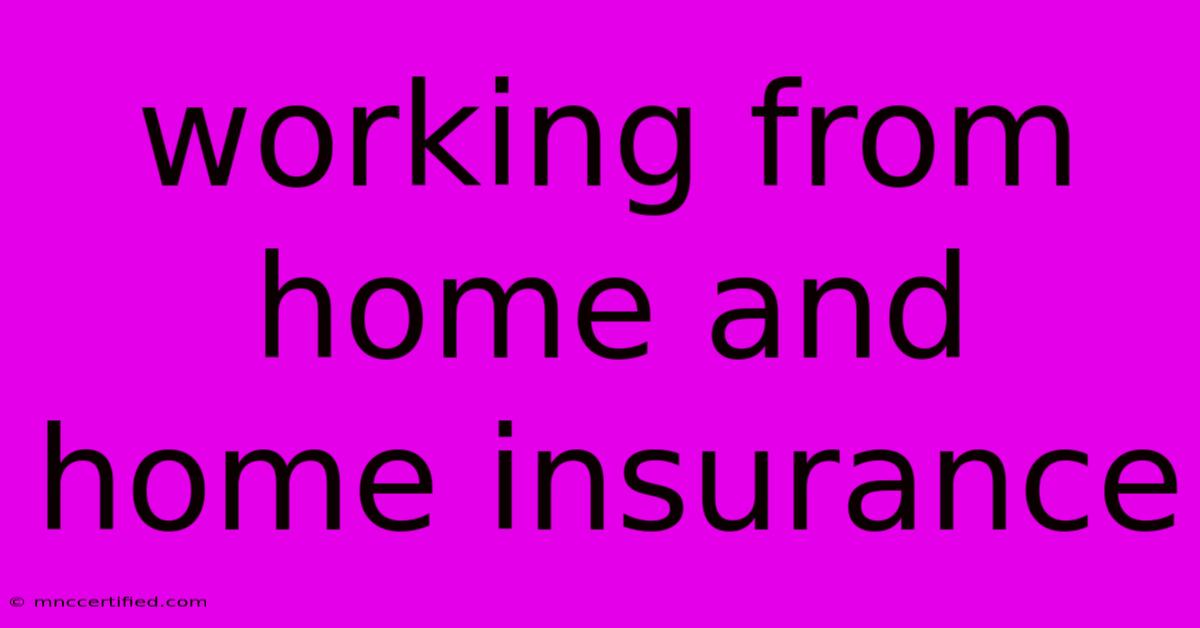Working From Home And Home Insurance

Table of Contents
Working from Home: How to Protect Yourself and Your Home Insurance
The rise of remote work has brought significant changes to our lives, transforming homes into offices and blurring the lines between personal and professional spaces. While working from home offers flexibility and convenience, it also raises new considerations for your home insurance. It's essential to understand how your current policy may be affected and what adjustments you might need to make to ensure adequate coverage.
The Impact of Working from Home on Your Home Insurance
Working from home can potentially increase the risks covered by your home insurance, impacting factors such as:
- Increased Property Value: If you've invested in home office equipment, furniture, or technology, the overall value of your belongings may have increased. Standard home insurance policies often have limits on coverage for specific items like computers, so ensuring adequate coverage for your home office setup is crucial.
- Liability Risks: Your home insurance covers liability for injuries or damages that occur on your property. Working from home could increase your liability exposure, particularly if you host clients or meetings at your home.
- Business Property Coverage: Standard home insurance typically doesn't cover business property or losses related to your business operations. If your home office equipment or inventory is damaged, your insurance might not cover the losses.
What You Need to Know About Home Insurance and Working from Home
1. Review Your Current Policy: Start by carefully reading your home insurance policy to understand the specific clauses related to working from home. Look for information on coverage for home office equipment, business property, and potential liability risks.
2. Consider Additional Coverage: You may need to consider additional coverage to address the risks associated with working from home. These can include:
- Home Office Equipment Coverage: This covers damage or theft of your computer, printer, office furniture, and other equipment used for work.
- Business Property Coverage: This protects your business inventory, supplies, and other assets used in your home-based business.
- Business Liability Coverage: This provides financial protection if you are sued for injuries or damages related to your business activities at home.
3. Inform Your Insurance Provider: It's important to inform your insurance provider about your work-from-home setup. This allows them to accurately assess your risks and ensure your policy provides adequate coverage.
4. Take Precautions: Alongside insurance, it's essential to take steps to minimize risks and protect your home and belongings:
- Security Measures: Install security systems, motion detectors, and strong locks to deter theft and vandalism.
- Fire Safety: Ensure you have functioning smoke detectors and fire extinguishers.
- Cybersecurity: Implement strong passwords, firewalls, and antivirus software to protect your computer and data from cyber threats.
Maintaining Coverage and Staying Protected
Working from home has become a significant part of our lives, and ensuring adequate insurance coverage is crucial. By reviewing your policy, considering additional coverage options, informing your insurance provider, and taking necessary precautions, you can protect your home, belongings, and yourself from potential risks associated with working from home. Remember, it's always better to be safe than sorry.

Thank you for visiting our website wich cover about Working From Home And Home Insurance. We hope the information provided has been useful to you. Feel free to contact us if you have any questions or need further assistance. See you next time and dont miss to bookmark.
Featured Posts
-
3 Keys For Jets Win Vs Cardinals In Week 10
Nov 11, 2024
-
Police Sheffield Wednesday Fan Mocked Baldock
Nov 11, 2024
-
Sheffield Wednesday Fan Faces Police Probe After Taunt
Nov 11, 2024
-
Does Gap Insurance Cover Hail Damage
Nov 11, 2024
-
Bitcoin Tops 81 K Will It Hit 100 K
Nov 11, 2024